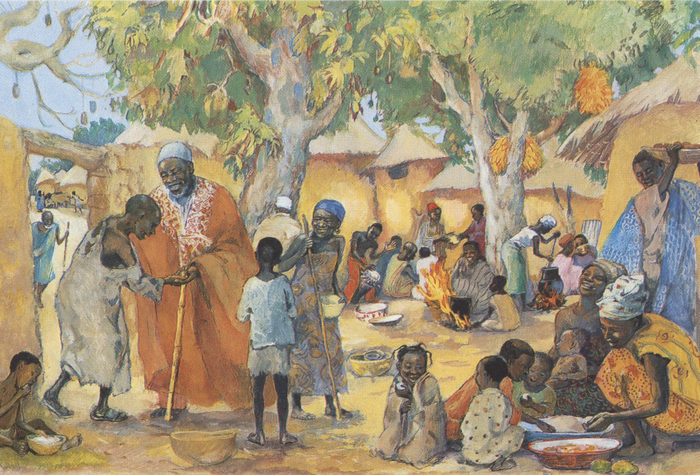Revised Common Lectionary Reflection, Proper 17 (22), Twelfth Sunday after Pentecost, Year C
September 1, 2019
Lessons: Proverbs 25:6-7; Psalm 112; Hebrews 13:1-8, 15-16; Luke 14:1, 7-14
Theme: God’s faithful and generous people respond to the call to practice radical hospitality just as Jesus preached and practiced in his ministry.
Key Scripture: Then he turned to the host. “The next time you put on a dinner, don’t just invite your friends and family and rich neighbors, the kind of people who will return the favor. Invite some people who never get invited out, the misfits from the wrong side of the tracks. You’ll be—and experience—a blessing. They won’t be able to return the favor, but the favor will be retuned—oh, how it will be returned!—at the resurrection of God’s people. Luke 14:12-14 (The Message)
 Once again in Luke’s gospel we encounter Jesus at a dinner party. This one is hosted by a leader of the Pharisees and takes place on the Sabbath. It’s not surprising that Jesus, as a rabbi, should be invited, and it’s also not surprising that he is being watched closely. What we don’t get in our Lectionary lesson are verses 2 to 6, where Jesus again exhibits compassion and heals a man on the Sabbath. This time, however, the guests are silent and offer no retort. Jesus doesn’t, however, stop there. Instead, he uses the gap in conversation to tell a story, a story sparked by his observation about how the guests jockeyed for the best seats at the table.
Once again in Luke’s gospel we encounter Jesus at a dinner party. This one is hosted by a leader of the Pharisees and takes place on the Sabbath. It’s not surprising that Jesus, as a rabbi, should be invited, and it’s also not surprising that he is being watched closely. What we don’t get in our Lectionary lesson are verses 2 to 6, where Jesus again exhibits compassion and heals a man on the Sabbath. This time, however, the guests are silent and offer no retort. Jesus doesn’t, however, stop there. Instead, he uses the gap in conversation to tell a story, a story sparked by his observation about how the guests jockeyed for the best seats at the table.
Perhaps riffing off a saying from Proverbs that serves as this week’s Old Testament lesson, and with which Jesus surely would have been familiar, he turns the table on the honor and shame culture of his day with a suggestion about seating choices. Take the worst seat in the house, he suggests. Better to be invited to a better seat than to have the host ask you to move to a seat by the kitchen door. It’s a lesson in humility: hopefully not a calculated and curated humility with secret ambitions of ending up glorified but rather an invitation to rethink the whole honor/shame culture.
That’s not all, however. Jesus turns to the host and offers some suggestions for future guest lists. Yes, both host and guests are served a lesson in radical hospitality that runs completely counter culture to their rules and practice of social engagement. Wouldn’t it have been fascinating to have been there and heard the responses to Jesus’ teaching—or better yet the “parking lot” conversation after the dinner?
There’s still a lot of jockeying for position and honor in our 21st century culture, and there are a whole host of folks left out and left behind. What then are we to take from Jesus’ teaching today?
If we look at the thematic ties that bind all four of our lessons together, it seems that practicing radical hospitality is the charge for the day. And just what is radical hospitality, one might rightly ask?
The hospitality referred to in the parable of the wedding banquet (Luke 14:7-14) is based on the Greek work philoxenia, a compound word that is  more aptly translated “to love the stranger.” Love of stranger and “the other” has met with a lot of challenges recently, especially as forces try to pit us against one another using fear, anger, and desperation. Jesus met these challenges by leaning in to heal, welcome, and restore others, even if it flew in the face of societal and religious norms.
more aptly translated “to love the stranger.” Love of stranger and “the other” has met with a lot of challenges recently, especially as forces try to pit us against one another using fear, anger, and desperation. Jesus met these challenges by leaning in to heal, welcome, and restore others, even if it flew in the face of societal and religious norms.
Maybe this is a time to take that holy pause like the folks at the Pharisee’s Sabbath dinner and ponder Jesus’ teaching. How can we turn fear to love? How can we see beyond the limits of our own contexts and social locations to reach those who have not been seated at the table, those who only want welcome and the opportunity to live a decent life? How can we show tangible love to all of our neighbors—even the ones who don’t look like us, share the same experiences and values, or think like us. To lean in to love God and neighbor is to practice philoxenia. To welcome to the table, to share, to listen, to learn, and to advocate for those who cannot advocate for themselves: These are a few actions that reflect radical hospitality. It doesn’t have to be overly complicated or orchestrated; it simply has to be real and from the heart. In doing so, we will both be and experience blessing beyond our wildest imaginings.
In Worship
Consider singing “Lord of All Nations, Grant Me Grace” (Evangelical Lutheran Worship #716) or a similar hymn that speaks of loving the stranger. This hymn was written by Olive Wise Spannaus (1916-2018), a Lutheran laywoman who was active in social justice and women’s issues.
Invite worshipers to identify “strangers” whom they find difficult love—either silently or in some creative way. Include prayer petitions for the Spirit to work in the hearts and minds of the congregation to help all people better practice philoxenia, or radical hospitality.
If you have someone in your worshiping community who embodies radical hospitality, consider doing a short vocational interview with them as part of worship.
With Youth
How about throwing a pop-up party with your youth today? You might make sandwiches and take them to a local park or area where people experiencing homelessness gather. Perhaps you could arrange to take snacks to your county nursing home. How about serving refreshments after a local work-release worship service? The idea is to take your hospitality on the road and out of your comfort zone. If you don’t have time to do something like this today, use the time to plan a future pop-up party and enlist the help of parents, grandparents, and other interested adults.
With Children
This week’s focus verse is Hebrews 13:8– Jesus Christ is the same yesterday and today and forever.
Ask the children what has changed in their lives since last week. Some may have returned from vacation. Others may have started school or sports practice. Some may notice changes in the weather or that today is the start of a new month. We live in a world of change. The seasons change, the weather changes, our bodies change; it seems that nothing stays the same. The good news is that Jesus stays the same, and we have scriptural witness to that. So what does it mean that Jesus is the same? It means that Jesus, who is the embodiment of God’s love, will always love us and be with us. We can count on that love, and we can share that never-failing love with others.
Finish with a short prayer of blessing for each child and the assurance that Jesus loves them.
Weekly Stewardship Bulletin Insert
Hospitality is a good thing, but radical hospitality is a God thing. It’s also good stewardship to use our time, talents, and resources in the service of others, particularly the stranger in our midst. How will you practice radical hospitality this week?
Stewardship at Home
Would it be possible for you to host an impromptu potluck gathering of neighbors on your street or apartment block sometime this week? It could be as simple as a shared dessert party or snacks and beverages in back yard. The idea is to begin to gather people together for conversation and shared food. Don’t worry about whether your house is well suited for a gathering. Just do it! Reflect afterwards on some of the blessings of the event. How might such gatherings be a foretaste of the heavenly banquet where all are invited to the table? How might this serve as a catalyst for regular gatherings throughout the year?
If is it not possible to host a dinner or other gathering around food, consider how you might practice radical hospitality in your workplace or in the community. What one action might you take this week to welcome the stranger and heal divisions?
2016 Reflection: https://www.stewardshipoflife.org/2016/08/to-be-continued/
2013 Reflection: https://www.stewardshipoflife.org/2013/08/invited-and-inviting/
Images: JESUS MAFA; garlandcannon; and Lange, Dorothea, 1895-1965. Children in a Democracy — On Arizona Highway 87, Maricopa County, from Art in the Christian Tradition, a project of the Vanderbilt Divinity Library, Nashville, TN, Creative Commons usage license. Thanks!
Note: Reprint rights granted to congregations and other church organizations for local, nonprofit use. Just include this note: “Copyright (c) 2019, Rev. Sharron Blezard. Used by Permission.” Other uses, please inquire: thewritelife@hotmail.com.




Leave a Reply